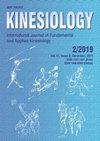Effect of acute whole-body vibration exercise with blood flow restriction on vascular endothelial growth factor response
IF 0.9
4区 医学
Q4 REHABILITATION
引用次数: 4
Abstract
This study aimed to investigate the effects of the whole-body vibration (WBV) exercise with and without blood flow restriction (BFR) on heart rate (HR), oxygen saturation (SpO2), and circulating vascular endothelial growth factor (VEGF) response. Ten physically inactive male adults participated in this study and completed WBV (frequency: 26 Hz; amplitude: 4 mm; 10 sets for 1 min, with 1-2 min of rest between sets) and WBV + BFR sessions in a repeated measures crossover design, with a 1-week interval separating the sessions. In the WBV + BFR session, participants wore a BFR device inflated to 140 mmHg on the proximal portion of the thigh muscle. Results indicated that WBV + BFR caused a greater HR response than WBV alone (p .05). Only the WBV + BFR session caused a significant increase in the VEGF response (p<.05), and WBV + BFR elicited a significantly higher VEGF response than did WBV after exercise (p<.05). In conclusion, an acute bout of WBV + BFR exercise magnifies the HR response relative to WBV exercise and induces an increase in circulating VEGF values. These alterations seem unrelated to systematic SpO2.Key words: oxygen saturation, heart rate, physically inactive male adults血液流动受限的急性全身振动运动对血管内皮生长因子反应的影响
本研究旨在研究有和无血流限制(BFR)的全身振动(WBV)运动对心率(HR)、血氧饱和度(SpO2)和循环血管内皮生长因子(VEGF)反应的影响。10名身体不活跃的成年男性参与了这项研究,并在重复测量交叉设计中完成了WBV(频率:26 Hz;振幅:4 mm;10组,持续1分钟,两组之间休息1-2分钟)和WBV+BFR疗程,疗程间隔1周。在WBV+BFR训练中,参与者在大腿肌肉的近端佩戴充气至140毫米汞柱的BFR装置。结果表明,WBV+BFR比单独使用WBV引起的HR反应更大(p。05)。只有WBV+BF治疗引起VEGF反应的显著增加(p<0.05),并且WBV+BFR在运动后引起的VEGF反应显著高于WBV(p<.05)。总之,急性WBV+BFR运动相对于WBV运动放大HR反应,并诱导循环VEGF值的增加。这些变化似乎与系统SpO2无关。关键词:血氧饱和度、心率、身体不活跃的成年男性
本文章由计算机程序翻译,如有差异,请以英文原文为准。
求助全文
约1分钟内获得全文
求助全文
来源期刊

Kinesiology
REHABILITATION-SPORT SCIENCES
CiteScore
1.90
自引率
8.30%
发文量
16
审稿时长
>12 weeks
期刊介绍:
Kinesiology – International Journal of Fundamental and Applied Kinesiology (print ISSN 1331- 1441, online ISSN 1848-638X) publishes twice a year scientific papers and other written material from kinesiology (a scientific discipline which investigates art and science of human movement; in the meaning and scope close to the idiom “sport sciences”) and other adjacent human sciences focused on sport and exercise, primarily from anthropology (biological and cultural alike), medicine, sociology, psychology, natural sciences and mathematics applied to sport in its broadest sense, history, and others. Contributions of high scientific interest, including also results of theoretical analyses and their practical application in physical education, sport, physical recreation and kinesitherapy, are accepted for publication. The following sections define the scope of the journal: Sport and sports activities, Physical education, Recreation/leisure, Kinesiological anthropology, Training methods, Biology of sport and exercise, Sports medicine and physiology of sport, Biomechanics, History of sport and Book reviews with news.
 求助内容:
求助内容: 应助结果提醒方式:
应助结果提醒方式:


